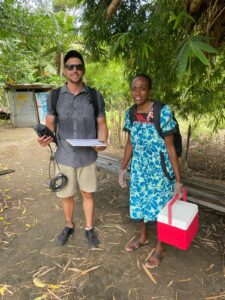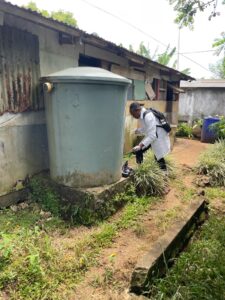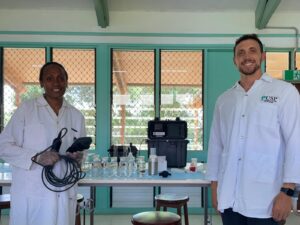
- Research project
- – Western Pacific
IWC’s Dr. Benny Zuse Rousso spent two weeks in Port Vila, working on the Water for Women funded project focused on climate-resilient and inclusive WASH solutions in underserved urban communities in the Melanesian Pacific.
Teaming up with Ms. Daisy Unguna, USP UrbanWaSH Project Manager, they consolidated the 6 month-plan of water quality monitoring across 11 sites in 2 informal settlements (Blacksands and Ohlen Mataso). The main goal is to understand water quality variations, especially in terms of faecal contamination, across different water sources (tap water, rivers, wells, rainwater), proximity to onsite sanitation systems (pit latrines), and weather conditions (dry weather, heavy rain, cyclone), to then inform planning and action from communities.

Benny and Daisy also engaged with community leaders, distributing posters explaining key findings from a household survey conducted last year. These posters were prepared for each of the 5 communities surveyed, covering everything from similarities and differences of water source types, sanitation systems, residents’ preferences and reports of climate hazards damage, empowering communities to take action.

Daisy reflected on her work so far on the project noting:
As a researcher, taking up this role and understanding the range of impacts that water and sanitation projects can have on people’s lives, particularly in underserved areas of our urban areas, highlights the crucial importance of access to drinking water and sanitation in any form of sustainable development. Based on my experience doing fieldwork and monitoring water during and after heavy rainfall shows evidence to support the argument that improvements to access proper sanitation and have clean water system should form the cornerstone of any approach to reduce or eliminate poverty. It is important for planners to understand the role that communities can play in participating in projects especially in implementation to gain information that helps them design projects that have a positive impact on communities.
Therefore, if water and sanitation is installed in these areas it will improve health and reducing the time it takes to fetch water for elderlies and the disabilities. Also, the impacts will improve people’s household income levels and livelihood security. For example, increased school attendance, as well as better child care, social and cultural benefits such as reduced stress levels, better family and community relationships, and an increased ability to observe rituals and customs religious.
Stay tuned for updates as the project continues to make positive waves of impact in WASH! You can learn more about the project here https://www.watercentre.org/research/research-impacts/planning-for-resilient-urban-wash-in-informal-settlements-in-pacific-islands/
